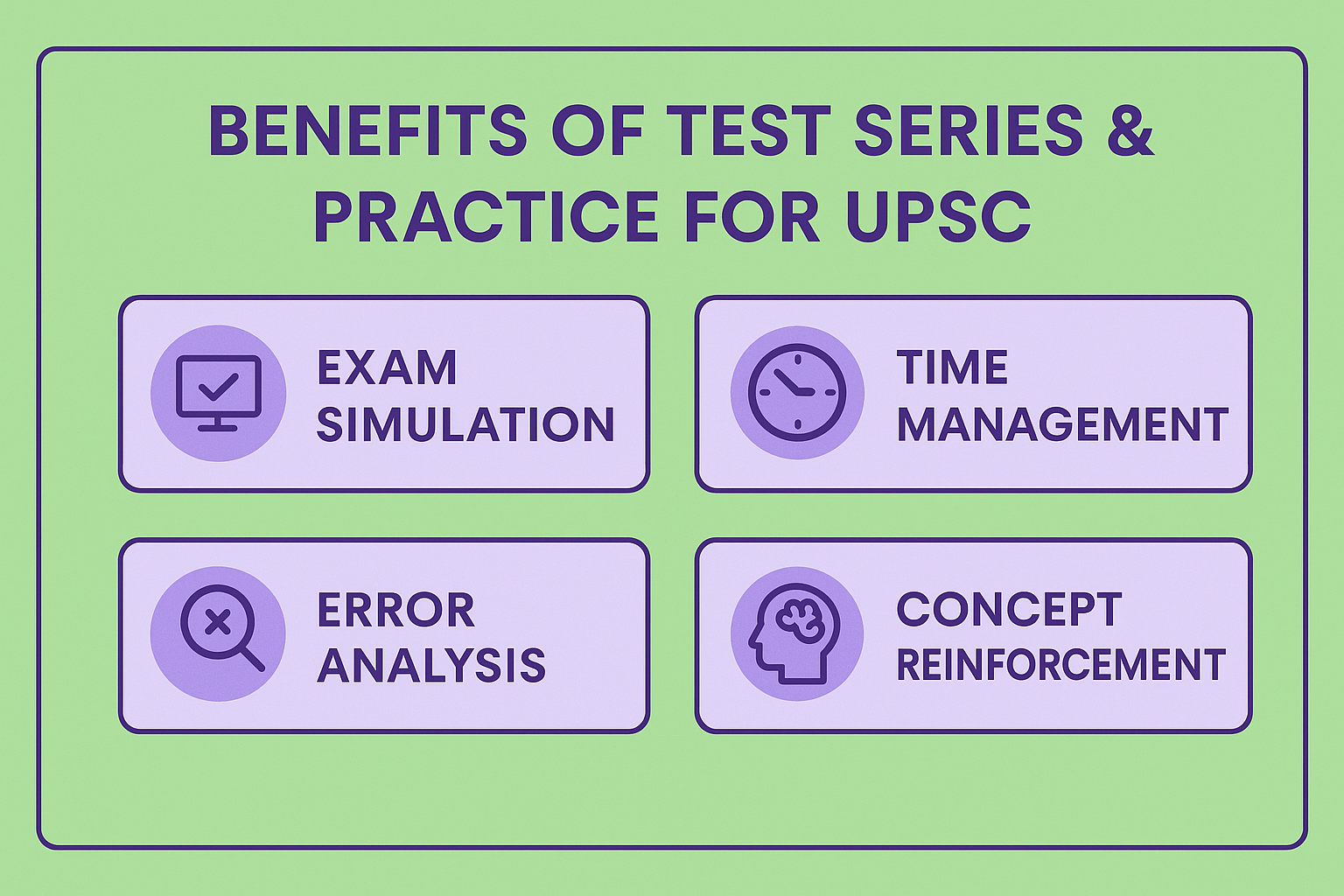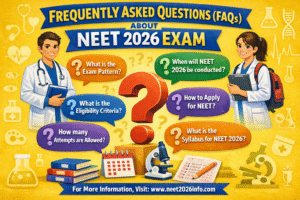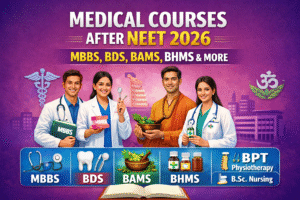Preparing for the UPSC Civil Services Examination (CSE) is a long journey that demands not only knowledge but also strategy, consistency, and exam temperament. Among the various tools available to aspirants, Test Series and Practice play a pivotal role in ensuring success. They provide a simulated exam environment, strengthen concepts, and improve time management.
This article explains the importance of test series, how to utilize them effectively, and the right strategy to practice for UPSC Prelims and Mains.
Why Test Series is Important for UPSC
Exam Simulation – Creates real-time exam pressure and prepares you mentally.
Time Management – Teaches you to attempt maximum questions within limited time.
Error Analysis – Helps identify weak areas and recurring mistakes.
Concept Reinforcement – Revising through practice tests strengthens static and current affairs portions.
Performance Tracking – Allows you to measure progress with each test.
Types of Test Series in UPSC Preparation
1. Prelims Test Series
Focus on MCQs from Polity, Economy, History, Geography, Environment, Science & Tech, and Current Affairs.
Essential for building accuracy, elimination techniques, and guesswork skills.
Practice at least 50–60 mock tests before the exam.
2. Mains Test Series
Includes Essay and GS papers with descriptive questions.
Improves answer writing skills, presentation, and structuring of answers.
Feedback from mentors helps in polishing writing style.
3. Optional Subject Test Series
Highly crucial for scoring well in optional papers (e.g., Public Administration, Geography, Sociology, etc.).
Practice enriches your ability to use diagrams, case studies, and subject-specific concepts effectively.
4. Sectional & Full-Length Tests
Sectional Tests: Focus on one subject/topic at a time. Best for initial preparation.
Full-Length Tests: Replicate real exam conditions and test overall preparation.
How to Approach Test Series for UPSC
Step 1: Start with Sectional Tests
Build concept clarity subject-wise.
Example: Start with Indian Polity sectional tests before attempting GS full tests.
Step 2: Gradually Move to Full-Length Tests
By mid-preparation, include full-length papers.
Practice them under real exam conditions (strict time & OMR sheet for Prelims).
Step 3: Analyze Every Test Attempt
Note down wrong answers in a mistake notebook.
Revise that notebook weekly.
Understand whether the mistake was due to lack of knowledge, guesswork, or misinterpretation.
Step 4: Focus on Revision
Test Series should not replace revision but complement it.
Revise NCERTs, Standard Books, and Current Affairs after every test.
Step 5: Maintain Consistency
Write at least 1-2 tests per week.
Increase frequency as exam approaches.
Benefits of Regular Practice in UPSC
Improved Accuracy – Builds confidence in tackling tricky questions.
Answer Writing Enhancement – Helps develop clarity, brevity, and structure.
Balanced Preparation – Ensures equal focus on all subjects.
Reduced Exam Anxiety – Familiarity with exam pattern reduces nervousness.
Better Revision Cycle – Keeps concepts fresh till the final exam day.
Practical Tips for Using Test Series
Do not chase multiple test series; stick to one or two reputed ones.
Attempt tests with seriousness, as if it’s the real exam.
Do not skip test analysis—it’s more important than attempting the test itself.
Keep track of score improvements after every 4–5 tests.
Join a test series that also provides mentorship and feedback.
Common Mistakes to Avoid in Test Series
Attempting tests without completing basic syllabus.
Focusing only on marks instead of analyzing mistakes.
Ignoring Mains test series while focusing only on Prelims.
Attempting too many test series from different institutes.
Not revising the test solutions regularly.
FAQs on Test Series & Practice for UPSC
1. Is joining a test series mandatory for UPSC?
Not mandatory, but highly recommended. It trains you for time management, accuracy, and performance under pressure.
2. How many mock tests should I attempt for UPSC Prelims?
At least 50–60 tests before the exam, including both sectional and full-length tests.
3. Should I focus more on sectional or full-length tests?
Start with sectional tests to build subject strength, then move to full-length tests to simulate exam conditions.
4. How do I analyze my mock test performance?
Note down repeated mistakes.
Revise concepts from books.
Check whether the mistake was knowledge-based, interpretation error, or time pressure.
5. When should I join a Mains test series?
Ideally, after Prelims preparation is solid, around 3-4 months before Mains. But daily answer writing practice should begin much earlier.
6. Should I join multiple test series from different institutes?
No. Stick to one or two reliable test series. Multiple series may confuse and waste time.
7. Can I clear UPSC without a test series?
It is possible, but chances are very low. Test series act as a practical training ground for the final exam.
✅ Conclusion: Test Series and Practice are not just about solving questions—they are about building exam temperament, refining strategy, and learning from mistakes. If used wisely with consistent revision, test series can be the game changer in your UPSC journey.







